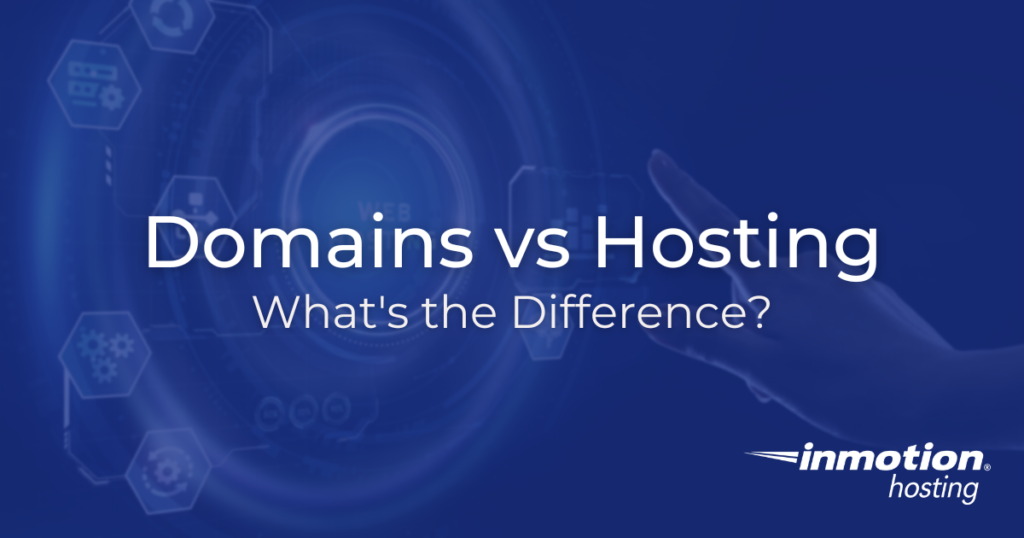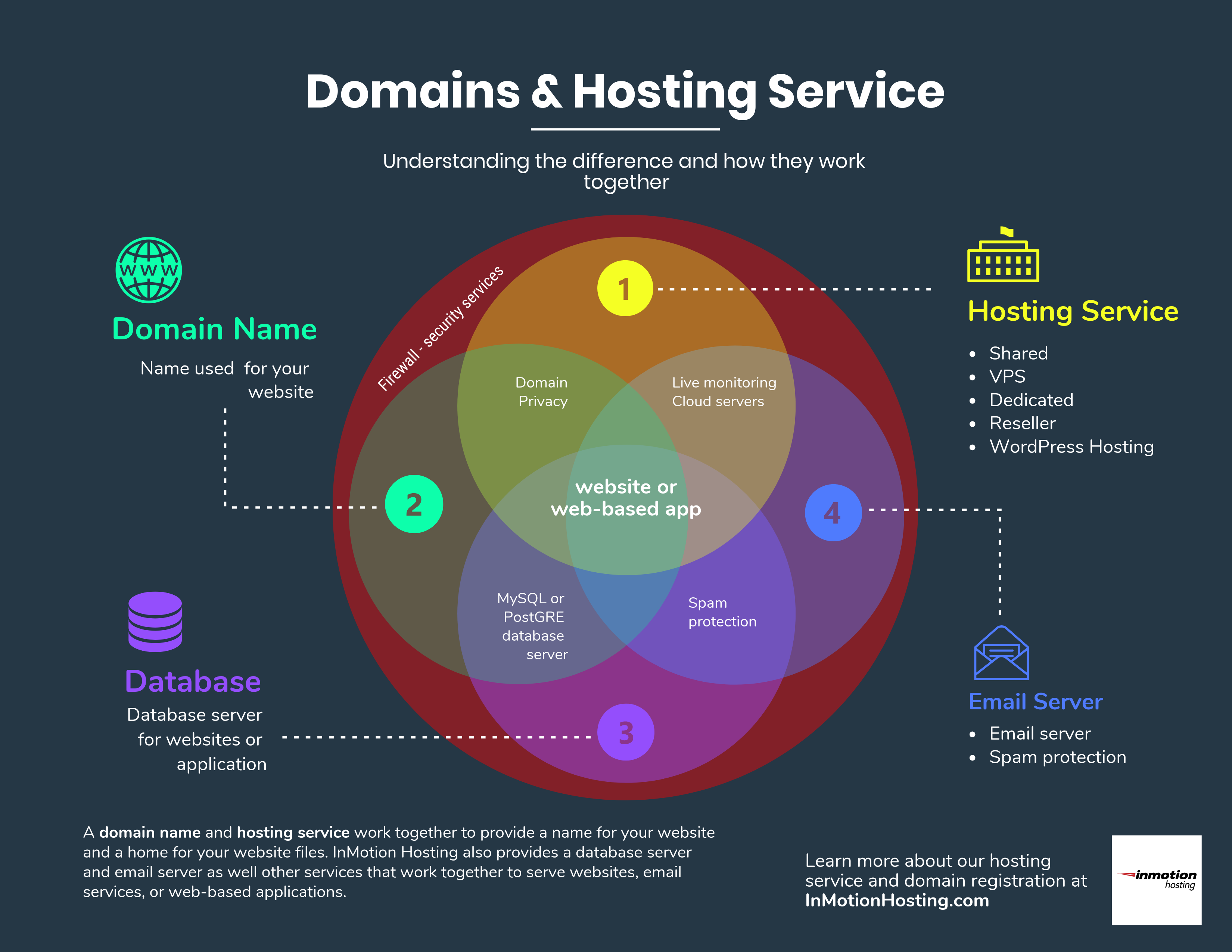
Successfully launching a website is relatively simple and can be done easily by even the most non-technical among us. However, navigating the digital world and its terms can be confusing for business owners new to online marketing.
For those new to the digital water, terms like domain, website and website hosting may seem interchangeable but they are all separate elements needed for the success of your online presence. This article will explain the difference between a domain and a website so you can create and manage your digital presence with ease.
Domain Names: Your Virtual Address
To properly explain what a domain name is, we must first briefly explain hosting and IP addresses. Web hosting is a service by a web hosting provider, like InMotion Hosting, who provides a home server for your website and allows it to be viewed by the public. An IP address is a long string of numbers that acts as your website’s home address and allows other computers/servers to find your website on the server.
However, because it’s hard to remember a string of numbers every time you want to visit your favorite website, domain names were born to allow humans to quickly and easily search the web. Essentially, a domain name is a human-friendly address for a website. The domain name points to the IP address which then allows your computer to find and load the website you’re trying to view.
For instance, our domain name is www.inmotionhosting.com. It’s the identifier that distinguishes your presence online.
Domain Name Registration
Securing a domain name involves registering it, much like claiming a piece of land. When you choose a domain name, you’re essentially staking your claim to that specific online address. This process ensures that no one else can take possession of your chosen domain, safeguarding your digital identity.
When choosing a domain name, your goal should be to make it as easy as possible for people to find your website. Most business owners choose to use the name of their company, like we did, to avoid any sort of confusion.
You may find, however, that when you try to register your domain name, someone else already owns it. That’s why we recommend having a list of backups just in case!
Note: When you register your domain name, it secures that address for your website alone, and no one else can use it. Usually, domain names are reserved for a year at a time – and once that period is over, you have to renew, or the domain becomes available for others to purchase.
Domain Hosting
While the concept of domain hosting might sound akin to website hosting, they’re separate entities. Domain hosting involves managing the technical details of your domain name, such as DNS settings. It’s the bridge connecting your chosen domain name to your website’s physical location, allowing users to find you on the internet.
Website Hosting: The Foundation of Your Online Presence
A website is the final destination of the IP address and the domain name. It is a collection of web pages with images, text, videos and other media, that provides information about a business, organization or topic. Websites can also be used to sell goods and services — including the sale and distribution of digital goods.
Website hosting provides the platform – the servers – that house these elements, ensuring your website is accessible to visitors at all times.
Your domain name helps your potential customers and readers find your website, however, your website convinces them to engage with and trust your business. Your website is your digital storefront. It is your space to successfully design, build and promote your business and brand.
In situations outside of the formal definition of web hosting, when someone talks about “web hosting” they’re not referring to the actual physical server that holds their website, but the company that provides those services. A hosting service owns and operates many different servers and rents them out to individuals so they can store their websites and the public can access them via the Internet. In most cases, these hosting companies will also provide any needed upgrades, maintenance, or repairs on the physical machines.
Domain Hosting vs. Website Hosting: The Clarification
To simplify this contrast:
- Domain Hosting is about managing the technicalities of your domain name, acting as a gateway to your website’s location like an IP address.
- Website Hosting pertains to the infrastructure that houses your website’s content, making it accessible to anyone who navigates to your domain.
In essence, the distinction between domain vs. hosting revolves around directing visitors to your digital doorstep (domain hosting) and offering them a welcoming, functional home (website hosting).

Do I Need a Domain and Hosting?
Absolutely, you need both a domain and hosting to establish a successful online presence. Your domain serves as your unique digital address, making it easier for visitors to find and remember your website. Without a domain, your website would be lost in the vast sea of the internet. On the other hand, hosting provides the necessary infrastructure for your website to function smoothly and be accessible to users around the clock. Think of it as the foundation of your online home.
A domain and hosting work hand in hand – the domain directs users to your virtual doorstep, while hosting ensures your website is always open and ready to welcome them in. So, whether you’re launching a personal blog or a business website, having both a domain and hosting is essential to creating a credible and engaging online presence.
The first step in creating any website is to secure your domain name. Once you add a hosting service, you need to update that domain name so it “points” to your web hosting provider. Often, you can purchase hosting service and a domain name from the same company, which greatly simplifies matters: you not only avoid the need to link the two accounts together but when it’s time to renew, you can handle everything through the same dashboard.
Have a great idea for a domain name, but you’re not quite ready to get started on design? That’s okay. You can reserve the name at any time, whether or not you have a hosting service lined up, and create your site at a later date.
Can I Change Hosting Companies Later?
Yes. For both website hosting and domain hosting, you can change providers at any time you like. For example, if you purchased web hosting from InMotion but got your domain name elsewhere, you could easily move your domain name over to make things easier to both manage and renew.
Likewise, you own your domain name and you can change its settings to point to any hosting provider if you decide to switch to a new company. Moving your files and data should be a seamless process if you are working with a reputable service, and once complete, you just need to update your domain name so it points to the correct location.
Conclusion
In the vast space of web development, it’s important to understand the difference between domain hosting and website hosting. A domain name acts as your virtual compass, guiding visitors to your website’s doorstep, while domain hosting bridges the gap between the name and its technical settings. On the other hand, website hosting forms the backbone of your online presence, providing the platform for your content to shine.
Remember, your domain is your online identity, and hosting is the backbone that keeps your site accessible to the world.
With these pieces of the puzzle in place, you’re ready to create your online presence to start showcasing your ideas, products, or services. Secure your domain and website hosting with InMotion Hosting today, and watch your online dreams come to life.
